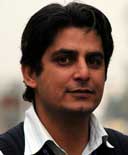Timeout in Afghanistan |
The Hollywood-style ending to Osama bin Laden life inside Pakistani garrison town has shocked as well as relieved the world. Quest for world’s most wanted man may be over, the mystery about his terror network has not been resolved. Though Pakistanis pre-dominantly paid a heavy price of 35,000 lives in Osama-inspired terror attacks, the country’s ordeal is far from over.
For Pakistan, Afghanistan and the NATO countries, OBL’s death has at least one silver lining. Now peace in Afghanistan is a viable business proposal for the West and the rest alike. Here too, devil lies in details that are more stereotyped than scrutinized. The British may talk to the IRA and Indians to the Hizb’ul Mujahideen but the idea of sitting down with the Taliban has always aroused widespread unease.
For long, the Taliban have been giving overtures of sorting matters out with the Karzai regime and its allies. With elements of fatigue evident, the militia seemed hostage to al-Qaeda leadership which has little belief in negotiations. Dramatic closure of OBL chapter clears the mist to a good degree, thus making search for viable options for peace and exit of foreign troops easier.
After his famous snub of Israeli leader Shimon Peres at Davos Summit 2009 and tough stance following Israeli attack on humanitarian flotilla, Ankara’s strongman Recep Tayyip Erdoğan has adopted yet another bold and clear approach to the world’s most complex trouble spot after the Palestine issue. Ankara, which has been busy breaking the ice between elected Pakistani leaders and their Afghan counterparts, is set to host an office of Taliban representatives on the Turkish soil, an idea floated by the Afghan President Hamid Karzai in December last year.
Understandably, the United States and other significant NATO players in Afghanistan are on board with Turkey. Besides enormous economic stress on the American and European leaders, dawn of Arab Spring in North Africa and Middle East, which many establishments in the West see as a new Pandora box, provides positive atmosphere for saner ideas to catalyze an early exit of 150,000 foreign troops in the tenth year of a faceless war in Afghanistan.
In sync with changing ground realities and shifting approach to the war in Afghanistan, the nomination of Ryan Crocker, a diplomatic giant who has served in Iraq, Pakistan, Syria, Kuwait and Lebanon, as ambassador in Afghanistan signifies diplomacy taking precedence over military in the war-battered nation. With Bush-era Secretary of Defense Robert Gates stepping down and CIA Chief Leon E Pentta set to replace him, and US Army Chief General David H Petraeus assuming charge of CIA after OBL’s killing, hopes for course-correction in Obama administration’s flawed Afghan policy seem more real.
Prior to Crocker, Afghan-American Zalmay Mamozy Khalilzad was seen as assertive and rather outspoken US ambassador in Afghanistan whose fireworks made headlines particularly in Pakistan from 2003 to 2005. With his departure from Kabul, US generals became more significant than its diplomats.
Being a Muslim nation with no imperial history during the Khilafat times and no shared borders with Afghanistan, Turkey remains historically trusted friend of the Afghan people, a time-tested NATO member and equally reliable friend for Pakistan.
Though Ankara did not acknowledge the Taliban government like Pakistan, Saudi Arabia and United Arab Emirates, Turkey did appoint Aydemir Erman, as the special coordinator for Afghanistan, who had access to the entire country despite taking critical position on various issues.
While the world powers in various time frames crossed swords with the Afghans, Turks are respected for not claiming a single life in history.
For the neighboring Pakistan, the cost of war against terror has surpassed any log book of accountancy. Human toll in extremist attacks, which may soar further more in the wake revenge attacks, has already strained social and political fabric of this nation caught in proxy war between United States and Soviet Union on one hand and Saudi Arabia and Iran on the other.
Regardless of the regime in power, Islamabad and Ankara maintained a low-profile but cordial diplomatic and political relations. Prime Minister Tayyip Erdoğan’s regime has taken the relations to the grassroots.
Taliban lack faith in almost every external mediator except the Turks whom they don’t see as aggressors in their country. The Afghan High Peace Council, headed by Burhanuddin Rabbani, was the first ones to propose a Taliban Office in Turkey to serve as a contact point for peace discussions.
The peace council chose Turkey while turning down offers for a similar facility in Germany, Iran, Saudi Arabia and United Arab Emirates.








 Naveed Ahmad is an investigative journalist with special focus on diplomacy, security and energy politics. He jointly heads
Naveed Ahmad is an investigative journalist with special focus on diplomacy, security and energy politics. He jointly heads 
Post new comment